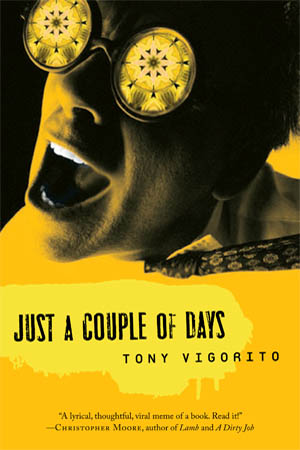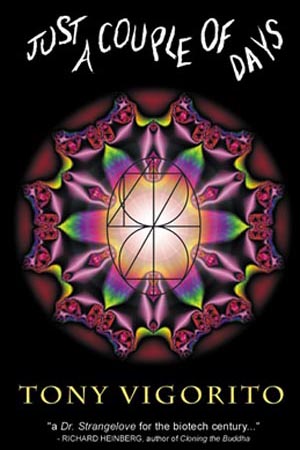 (The following interview was originally published on Globalish, and is exclusively about Tony’s first novel. A more general interview is available here.)
(The following interview was originally published on Globalish, and is exclusively about Tony’s first novel. A more general interview is available here.)
Spoiler Alert: In discussing his novel, Just a Couple of Days, the following interview necessarily reveals major plot twists. If you wish to be entirely surprised by the story, the reader is encouraged to enjoy the book first, and to read this interview as an Afterword.
Globalish: First off, we loved the book. Congratulations on such a marvelous work of art. So, to begin, everything we do at Globalish lives at the intersection of awakening and emergent global culture, and as we see it, Just a Couple of Days also lives at this intersection. For our interview today, we’d like to focus less on plotline, characters, etc. and more on your “personal” journey and the topic of “awakening,” something you seem to consistently point to throughout the book. Question number one—can you tell us a little about your “seeker’s journey?” In order to write at the depth you do in Just a Couple of Days, it would seem that you have done quite a bit of self-inquiry.
Tony Vigorito: The “seeker’s journey” you mention brings to mind Joseph Campbell’s “hero’s journey.” According to Campbell, each of us is potentially the stout-hearted hero of our own life. A hero must be willing to enter the wilderness without a map, to err, to stumble, and to suffer injury, for as Hermann Hesse reminded us in Siddhartha, “wisdom cannot be passed on,” but can only be wildcrafted from the ruthless experiences of one’s own life.
As for my own life, there’s no escaping the fact that I had an uncommon sort of childhood, one which inadvertently revealed the axle-groaning wagonload of bullshit our socialization has hitched us to for what it really was – and at a very early age. In retrospect, this very naturally led to my eventually earning a doctorate in social psychology. As Schopenhauer observed, when a person looks back upon their life there appears to be a plot, and indeed, as I’ve grown older, I’ve discovered that what seemed at the time to be stumbles of fortune have in the long run become sparkles of fortune.Human life has long felt to me like a carnival of distractions vying for our attention, as if attention itself is some form of universal currency out of which reality is constructed.
That said, human life has long felt to me like a carnival of distractions vying for our attention, as if attention itself is some form of universal currency out of which reality is constructed (indeed, perhaps this is why we say “pay attention…”). The game, it seems, is to fool us into identifying with any number of external identity illusions that seek to harness our attention, for once we confuse our selves with what our social world tells us that we are, it becomes tremendously easy to compel our participation in any number of palpatine projects that don’t have our best interests at heart, not even remotely. This is a tremendous diminution of human potential—quite like convincing the sun that it’s a candle—for we are each of us far more intelligent than we have ever been led to believe.
Just a Couple of Days is filled with koans – Blip and Sophia’s love letters, graffiti messages, the Pied Piper virus experience, interesting questions like “Why aren’t apples called reds?” and on and on. Would you describe Just a Couple of Days as a “spiritual” text?
Throughout mystical philosophy, there is a recurring theme of ineffability – the idea that the ultimate reality that is being described actually cannot be described, that it is in fact supralingua, or beyond the capacity of language to represent. Fathoming this, a koan attempts to indirectly inspire meaning rather than to directly indicate it. In this sense, a koan has more in common with music than it does with writing, in that music is a technology that seeks to inspire an emotional experience beyond language. If my writing has ever achieved anything resembling this, then it has been worth all the lonely years at my desk.
Have you ever heard of Persistent Non-Symbolic Experience (PNSE) and/or the research of Dr. Jeffery A. Martin? It seems quite similar to the effects the “Pied Piper virus” had on people in Just a Couple of Days.
 Until I googled it today, I had never heard of Persistent Non-Symbolic Experience. From what I have (very briefly) read about it, it does not surprise me, meshing well with the notion of ineffability that so characterizes mystical experience. As you know, one effect of the Pied Piper virus in Just a Couple of Days was to eliminate a person’s symbolic capacity. While the Pied Piper virus was intended as a form of biological warfare to disorganize an enemy’s forces, it inadvertently removed the veil of illusion—constructed entirely out of language—from human perception, thereby unleashing the ineffable, the untamed and universal ground of being, and that which is beyond the capacity of language to represent.
Until I googled it today, I had never heard of Persistent Non-Symbolic Experience. From what I have (very briefly) read about it, it does not surprise me, meshing well with the notion of ineffability that so characterizes mystical experience. As you know, one effect of the Pied Piper virus in Just a Couple of Days was to eliminate a person’s symbolic capacity. While the Pied Piper virus was intended as a form of biological warfare to disorganize an enemy’s forces, it inadvertently removed the veil of illusion—constructed entirely out of language—from human perception, thereby unleashing the ineffable, the untamed and universal ground of being, and that which is beyond the capacity of language to represent.
How would you define awakening? And do you consider PNSE the equivalent of awakening?
While I have not read enough about PNSE to comment upon it, I can observe that awakening necessarily implies that we must be asleep in the first place. Given that, it can hardly be a restful slumber, since—paraphrasing James Joyce—history is a nightmare from which we are trying to awaken. That nightmare, I think, is defined by how groggily we identify with our clumsy, lonely, alienated, confused, and insecure egos rather than that deeper, universal version of our selves that senses the rumored Edenscape of love and compassion that mystics, poets, prophets, and rowdy saints have been raving about for millenia. Any awakening worth a decent cup of coffee could only be something resembling that ecstatic perception.
On page 151, Blip Korterly says, “Hell is separation from the source.” Is this just the character Blip talking or is this coming from your own felt experience? Either way, can you say a little more about it? What do you mean by “the source?” How does one become separated from it?
Alan Watts wrote a book called The Supreme Identity some decades ago, and while it was perhaps the densest exposition of his ideas, the central concept—the notion that there is a supreme identity that impassively witnesses the sound and fury of one’s illusory egoic identity—has always stayed with me.It is only insofar as our socialization has cajoled us into locating our selves within our flimsy egoic identities that we suffer under so much strife.
In contrast to the relentless insecurity and bristling anxiety that characterizes the experience of egoic identity, the experience of supreme identity is characterized by boundless love and creative potential. In this way of thinking, it is only insofar as our socialization has cajoled us into locating our selves within our flimsy egoic identities that we suffer under so much strife. The supreme identity sees all of life as expressions of the same eternal impulse, and would no sooner strike another down than cut off one’s own leg, or as the Sufi poet Hafiz once wrote:
I have come into this world to see this:
the sword drop from men’s hands
even at the height of their arc of rage
because we have finally realized
there is just one flesh we can wound.
On page 165, Blip says, “the self is nothing more than a ridiculous illusion at best and a destructive delusion at worst.” What is the self? And would you agree with Blip’s statement?
Social psychologically, the self is simply your internalization of others’ points of view. The self is how you modify your behavior in accordance with social expectations, and it is why you are so sensitive to others’ estimations of your character. Institutionalized mechanisms of socialization have conned you into locating your self within society’s walled-in fortress of solitude, restricting the boundless love and unlimited creative potential of your consciousness into any number of worthless distractions designed to lullaby you throughout the slumber of your lifespan. It’s a bit of a raw deal.The greatest trick the devil ever pulled was convincing the world that he exists.
In this sense, the self is actually the voice of society in your head pretending to be you. This is precisely what Robert Anton Wilson meant when he wrote that, “Society is the devil’s masquerade.” Given this—and in contrast both to Baudelaire and The Usual Suspects—I like to say that the greatest trick the devil ever pulled was convincing the world that he exists. Love, as it turns out, isn’t merely all you need. Love is actually all there is.
We loved the part of the book where Agent Orange becomes the “guru.” She basically calls Dr. Fountain on his bullshit—telling him that it’s obvious he believes that the experience of the Pied Piper virus has liberated the human spirit, but still, Dr. Fountain is scared to death to “join the party” and have his symbolic capacity dissolved. What do you think is so scary to people about the prospect of dissolving the separate self?
In a geyser of cultural irony, the anthropologist Ernest Becker posthumously won the 1973 Pulitzer Prize for his book, The Denial of Death. In it, he posits existential terror as unique to humanity, since existential terror is borne out of the awareness of being alive and the inevitable death this necessarily implies. Essentially, our fear of a meaningless and absolute annihilation motivates us to locate our selves within the symbolic universe that society provides—in our egoic identity rather than our supreme identity. Locating our selves in this mud puddle rather than the ocean, we are kept fully distracted with petty dramas and social fictions that pretend to grant us purpose and meaning. In this way, we avoid staring down the barrel of our mortality and thereby realizing the wisdom that this ultimately implies. In effect, we exert tremendous psychological energy denying death rather than risking the realization of our supreme identity.
 Dissolving this separate self implies raising the portcullis and expanding one’s consciousness into the wilds of mind outside society’s fortress of solitude pretending to be each and every one of us. And as if the prospect of that weren’t terrifying enough, the moat surrounding this fortress threatens all insiders with the most dreadful fears and anxieties in order to dis-courage anyone from their heroic adventure into wisdom, or that which cannot be taught.
Dissolving this separate self implies raising the portcullis and expanding one’s consciousness into the wilds of mind outside society’s fortress of solitude pretending to be each and every one of us. And as if the prospect of that weren’t terrifying enough, the moat surrounding this fortress threatens all insiders with the most dreadful fears and anxieties in order to dis-courage anyone from their heroic adventure into wisdom, or that which cannot be taught.
In the final chapter of The Book O’ Billets-doux, this is written: “The fall of humanity was the fall from the actual to the symbolic.” Can you describe what you mean by “the actual?”
In the same way that im-mortal is the opposite of mortal, im-mediate is the opposite of mediate. Language is what mediates human perception, permitting us to access the knowledge of our cultural heritage, on the one hand, but ultimately orienting our perceptions to our culture’s mediated descriptions of reality (the symbolic) rather than to im-mediate reality itself (the actual).
Did you know, for example, that while women are more likely to have a heart attack than men, that men are more likely to die from a heart attack than women? The reason for this odd statistic has to do with how men perceive themselves: Men are socialized to perceive themselves as powerful and in control, and so end up delaying something as simple as seeking help. They do not perceive their actual circumstance, in other words, but rather a symbolic distortion of that circumstance, as mediated by their culture, and to tragic effect.
One could cite a thousand similar tragedies of confusion. Transcending this trap and embracing the immediacy of one’s life is what countercultural mystic Ram Dass was doubtless promoting with his well-traveled exhortation to “be here now” and all that sort of jazz.
On page 378, Dr. Flake Fountain says, “I am what I am, with nothing better to do but what I do.” In your experience, is there an autonomous “doer?”
This is an interesting question to me, as the quoted line is itself an example of an unpremeditated line that somehow managed to find its way on to the page. Given that, your question of whether there is an autonomous “doer” seems to answer itself. (This is, incidentally, a theme I explore in my second novel, Nine Kinds of Naked).In the same way that the sculptor discovers the form hidden within the block of granite, I have “discovered” new characters and major twists within my stories as I was writing them.
The act of writing, as with any other artistic endeavor, often feels to me like a process of discovery. In the same way that the sculptor discovers the form hidden within the block of granite, I have “discovered” new characters and major twists within my stories as I was writing them. It’s part of what makes the process so enjoyable, in that I get to be as surprised by how the story unfurls as my readers.
When the artist succeeds in getting out of the way, artistic expression is absolutely an expression of supreme identity. This is, incidentally, why artists sometimes find themselves uncomfortable in the face of compliment. Locating themselves in their egoic identity—as participation in society demands—the egoic identity of the artist knows it had very little to do with the inspiration behind the art, and so the artist can’t help but feel as if they’re taking credit for something that they actually didn’t come up with. A friend of mine, also an artist, once offered an excellent perspective on accepting compliments that I would like to pass along, in my own words:
The trick to gracefully accepting a compliment is—rather than accepting the compliment from your egoic identity—the trick is to accept the compliment from your supreme identity. Then, it no longer feels like you’re thanking someone for something as desperately insignificant as temporarily inflating your narcissistic ego, and instead the context exponentially expands to where it feels like you’re joining with them for something as magnificent as giving thanks for life and the universal ground of being of which we are after all indistinct.
Thanks so much for the time, Tony. So cool to do this with you.
If I may exponentially expand our context, thanks so much for the time indeed, and it is so cool to do this with you as well.
What a gift we are to us.
Leave a Reply
You must be logged in to post a comment.